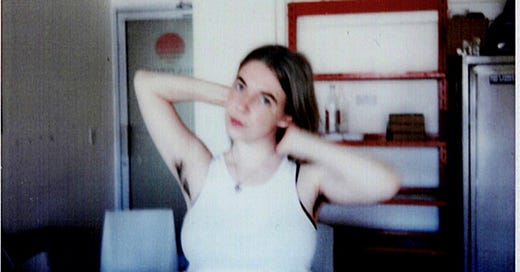“It had a divine hold on him.”
What do you think is being described here?
Great art or great sex?
Giovannitti’s book blurs the two. She writes about her experiences as a practising artist and sex worker; not just the high-minded philosophy but the material, messy reality, its blurry edges, mechanics, and contradictions.
I find her writing most compelling when she holds a dirty mirror up to the art world. One that shows a reflection of capitalism running rampant but pretending not to be. Where young artists get into disempowered relationships with the powerful men who can progress their career; where affluent clients are quietly thrilled to support the work of the sex-worker artist they fuck, and would only be disappointed to learn their money is spent merely on food and rent. The corrupted dynamics of the powerful, and the way she navigates them, concocting trades to offer them her body so they might buy her art.
Eventually, the sex work becomes the subject of her artistic career – through her writing, photography, performance, and installations.
ULTRA is fascinated with embodiment; a crucial tenet of an art landscape after AI.
So what about when your body becomes the art, and what pays for it?
Insights that struck me:
—
ART WORK, LIKE SEX WORK, IS THE COMMERCIALISATION OF AFFECT
Many of us – myself, for sure – talk about art in high-minded terms... illumination, Muses, the sublime, euphoria. Sex too, the way the ancient Greeks discussed Eros as the ultimate creator energy.
So some of us might find it discomfiting that transcendence has a price tag. Art and sex have a monetary value, when it really comes down to it.
Giovannitti created a performance work, Incall, that riffed on the idea of a prostitute’s working space. Visitors exchanged money to enter the space, and their conversations and interactions were recorded as part of the performance. It was all just performance, but then again – one patron could pay $20,000 for a unique nightlong experience, which… wouldn’t be recorded.
Is it about the sex? Not really. Sex in this context is performance. People buy sex from the person who makes them feel the way they want to feel, to be reflected back on themselves. They buy the piece of art because of how it makes them feel, and how it reflects back on themselves, what it says about them.
In both cases, the emotion is the mechanism and the product.
The commercialisation of affect.
WHO OWNS IT?
Who owns the story? It isn’t always who tells the story.
Especially when there is often such slippery definitions around the artistic merit of the erotic. In old money — a man taking a nude portrait is making art; a woman taking a nude selfie is pornography. Scroll Instagram: there’s a rich post-feminist arc of attractive female e-girls, flouting their gorgeous faces, their sexy pouts, their bodies, all to raise the profile of their art.
(That’s not a criticism, by the way. Building profile in the attention economy is a knife-fight. When you’re gorgeous, you might as well use it. You’re lucky I run a faceless account, or it’d be over for you bitches.)
Women and femmes taking agency over their own sexualisation makes some critics uncomfortable. For these creators to be brazenly erotic blurs the line into pornography; sensation without feeling or artistic merit. It creates a hierarchy of status, of income, of repute.
There’s a funny story in the book – about a renowned photographer who shot artistic photos behind the scenes on a pornographic film shoot. The photos? Art. The filming? Porn.
DEPROFESSIONALISM
Near the end of her book, Giovannitti writes a paean for change, riffing on the work of the Clandestine Whores Network. It posits the kind of situation where the outcasts, the outsiders, the whores (and, one might suggest, the artists), are to be feared. The move through the city, rooftop snipers carefully tracing the movements of any would-be attackers.
There is a felt tension in the idea of professionalisation within the arts. To be professionalised is to be paid fairly, but only within the context of a system of wage-slaves. Maybe there is merit in being deliberately outside the system, making a new system, demanding the money and power the current framework denies you.
Many of the artists I speak to feel the ravages of a broken model, an art world that is (as Richie Culver memorably posted in an Instagram story recently), it’s so far behind it thinks it’s in front.
Maybe artists do need protective snipers. Maybe the whores that rise up are the ones that really have the power. Giovannitti quotes union leader Bob Crowe, on the realisation that the world need not be the way it has been prescribed to us:
If we all spit at once, we’ll drown the bastards.
.
.
.





